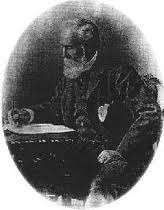James Forlong

James George Roche Forlong (6 November 1824 – 29 March 1904[1]) was a Major General of the Indian Army who trained as an engineer in Scotland and England.
Life
He joined the Indian Army in 1843 later filling various posts including that of Secretary and Chief Engineer to the government of Oudh. Exposure to Indian religions while doing missionary work led him to abandon his Christian faith, and into some very heterodox ideas about religious origins, including those of the ancient Hebrews. These found expression in his massive work of comparative religion, Rivers of Life,[2] with its markedly sexual, some would say blasphemous,[3] interpretation of religious rites and symbolism. He was an Honorary Associate of the Rationalist Press Association, to which he left a sum of money in his will.
He died in 1904.[4] He is buried in Dean Cemetery in Edinburgh.[5]
Rivers of Life
"...the shower of phallicism that burst upon the reading public in the shape of General Forlong's Rivers of Life".[6]
The book is in two large volumes together with a huge coloured Chronological Chart of the Religions of the World representing different currents:-
All of these originated very early in mankind’s history, and form streams flowing down the millennia and separating and commingling into the major religions.
Some Themes
Like Payne-Knight, D’Hancarville and Hargrave Jennings he is of the phallicist school of religious anthropology. Phallic worship had two wings, the right hand, or lingam and the left had path of the yoni worshipers,
The Garden of Eden story was simply that of human generation. Eve bruised the serpent’s head and he bruised what is euphemistically called her heel.
The Ark of the Covenant represented a female sex organ or yoni, and the two stones it contained signified testicles.
The early Jews practiced a most crude and extreme form of phallic worship. Elohim was the same as Baal and their worship was lingamist, the Yahweh worshiping revolt against it (spearheaded by the prophets) was a pro-yoni movement, like Indian Shaktism.
Christian churches are constructed on phallic principles.
All these ideas are backed up which great erudition and parallels from antiquity, India and the far east.
Quotes
The numerous tales of holy trees groves and gardens repeated everywhere and in every possible form justify me in my belief that Tree Worship was first known and after it came Lingam or Phallic, with of course the female form A-dama.[7]
He [the Serpent] is the special Phallic symbol which veils the actual God and therefore do we find him the constant early attendant upon Priapus or Lingam, which I regard as the second religion of the world.[8]
Phallic Worship, the second if not the first of man’s faiths. [9]
External links
Notes and references
- ↑ Sources according to ancestry.com: "Ian Patterson's printouts, given to Robin; IGI"
- ↑ Rivers of life : Vols 1 and 2. or sources and streams of the faiths of man in all lands showing the evolution of faiths from the rudest symbolisms to the latest spiritual developments. B. Quaritch: London; Edinburgh, printed, 1883.
- ↑ See for example an orthodox view on this type of interpretation: "Such an interpretation of the Ark of the Covenant constitutes the highest blasphemy, and yet is precisely the perverted view which Antichrist will hold toward the Ark of the restored Jewish Covenant." Ralph Woodrow: Babylon Mystery Religion, Evangelistic Association Inc, Palm Springs 1966
- ↑ A Biographical Dictionary of Modern Rationalists, Watts & co London 1924
- ↑ https://www.flickr.com/photos/duncan/sets/72157644250829973/detail/
- ↑ H P Blavatsky - Buddhism, Christianity And Phallicism, in Lucifer, a Theosophical Magazine, 1896
- ↑ vol 1 p34
- ↑ vol 1 p93
- ↑ vol 1 p117
|